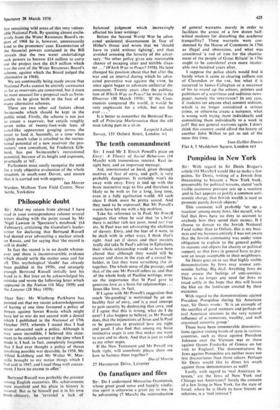Philosophic doubt
Sir: After my return from abroad I have read in your correspondence column several letters dealing with the point raised by Mr Nigel Lawson in 'Spectator's notebook' (14 February), criticising the Guardian's leader- writer for declaring that Bertrand Russell had denied ever advocating a nuclear attack on Russia, and for saying that 'the record is still in doubt'.
In fact the record is in no doubt whatso- ever and there is incontrovertible evidence which should settle the matter once and for all. This mythological 'doubt' has already been peddled in the 1950s, and strangely enough Bertrand Russell initially lent his hand to it. But later on he acknowledged his mistake and wrote the following letter which appeared in the Nation (16 May 1959) and the Listener (28 May 1959):
`Dear Sirs: Mr Winthrop Parkhurst has pointed out that my recent acknowledgement
of having at one time favoured a policy of threats against Soviet Russia which might have led to war do not accord with a denial which I published in the National of 17th October 1953, wherein I stated that I had never advocated such a policy. Although it may seem incredible, I believed this state- ment to be entirely correct at the time when I made it. I had, in fact, completely forgotten that I had ever thought a policy of threat involving possible war desirable. In 1958, Mr Alfred Kohlberg and Mr Walter W. Mar- seille brought to my notice things which I had said in 1947, and I read these with amaze- ment. I have no excuse to offer.'
Bertrand Russell was probably the greatest among English eccentrics. His achievements were manifold and his place in history is assured. But as he himself put it in his own mock-obituary, he 'revealed a lack of balanced judgment which increasingly affected his later writings'.
Before the Second World War he advo- cated unilateral disarmament in face of Hitler's threat and wrote that we 'should have to yield without fighting', and thus avoided arousing the ferocity of the adver- sary. 'No other policy gives any reasonable chance of escaping utter and terrible disas- ter .. .'-(Which Way to Peace? 1938). He later changed his position about that but after the war and an interval during which he advo- cated preventive war against the USSR, he once again began to advocate unilateral dis- armament. Twenty years after the publica- tion of Which Way to Peace? he wrote in the Observer (30 March 1958): 'If the Com- munists conquered the world, it would be very unpleasant for a while, but not for ever ...
It is better to remember the Bertrand Rus- sell of Principia Mathentatica than the old man taking part in a sit-in.


































 Previous page
Previous page